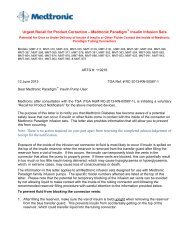Tamil - Australian Diabetes Council
Tamil - Australian Diabetes Council
Tamil - Australian Diabetes Council
- No tags were found...
You also want an ePaper? Increase the reach of your titles
YUMPU automatically turns print PDFs into web optimized ePapers that Google loves.
16<br />
Chronic complications<br />
Blood glucose (sugar) levels that remain high for long periods of time can cause diabetes<br />
related complications such as eye disease, kidney disease, nerve damage as well as heart<br />
disease and circulation problems. High blood glucose levels also increase the risk of infection<br />
and slow down recovery from infection. For these reasons it is very important that you try<br />
and keep your blood glucose levels within the ranges recommended by your doctor or<br />
diabetes health care team.<br />
<strong>Diabetes</strong> and eye disease:<br />
Damage can occur to the back of the eye (retina) where there are very fine blood vessels<br />
important for vision. This is called diabetic retinopathy. The development of retinopathy is<br />
strongly related to how long you have had diabetes and how well the blood glucose levels<br />
have been controlled.<br />
High blood pressure, high cholesterol levels and kidney failure can also affect the severity of<br />
diabetic retinopathy.<br />
Vision loss or blindness is preventable through early detection and treatment.<br />
The treatment for diabetic retinopathy can be laser therapy or surgery.<br />
Glaucoma and cataracts can occur at an earlier age and more often in people with diabetes.<br />
Cataracts affect the eye’s lens causing it to become cloudy with a loss of vision. The treatment<br />
for cataracts is surgery.<br />
Glaucoma occurs when the pressure inside the eye becomes very high, causing damage to<br />
the optic nerve. The treatment for glaucoma can be eye drops, laser therapy or surgery.<br />
<strong>Diabetes</strong> and kidney disease:<br />
Your kidneys help to clean your blood. They remove waste from the blood and pass it out of<br />
the body as urine.<br />
Over time diabetes can cause damage to the kidneys. If the kidneys fail to work properly,<br />
waste products stay in the body, fluids build up and the chemical balance is upset. This is<br />
called diabetic nephropathy.<br />
You will not notice damage to your kidneys until it’s quite advanced, however early signs of<br />
kidney problems can be detected through a urine test.<br />
Finding out about early kidney damage is simple and painless and should be checked every<br />
year from the time of diagnosis of diabetes. Treatment at this time can prevent further damage.<br />
In severe kidney disease dialysis treatment or a kidney transplant may be needed.<br />
People with diabetes are also at increased risk of infection of the bladder, kidneys and urinary tract.<br />
The good news is that the risk of developing kidney problems can be reduced by: stopping<br />
smoking if you smoke, managing your blood glucose levels, having regular kidney and blood<br />
pressure checks and leading a healthy lifestyle.<br />
74
















